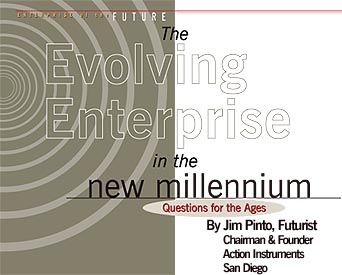
VOLUME 2, NUMBER 1 | FEBRUARY/MARCH 1999

|
'Tis the eve of the new millennium A break in the time continuum Will the world collapse in delirium With Y2K pandemonium? Will the stock market fall in opprobrium? Or simply find new equilibrium? Will Bill Gates continue his presidium? Or extend his growing residuum? In the evolving enterprise symposium We produce for a global emporium With profit part of the curriculum But change dissipates our premium. Will the world find a new moratorium? Or explode in a nuclear crematorium? Anticipate the swing of the pendulum As we enter the new millennium. |
The millennium countdown continues and brings up nightmares and dreams beyond the regular evolution of enterprises and progress in the global village. Although time is measured using a seemingly artificial, man-made clock, the reality of our dependence on technology and its adjuncts begins to dawn on us.
Think about this — where will you be on Dec. 31, 1999, as the New Year approaches? Will you choose to travel on that day? In an airplane? In spite of the tremendous preparation for avoidance of Y2K problems, how many individuals will actually entrust their lives to the airlines on that day? How will that visible mirror of business progress — the stock market — respond as the once-in-a-thousand-year event approaches? Will you leave your money in the stock market? Or, will you turn it into hard cash? Will there be a run on the banks? Will you convert your money into gold? Or, hide it under your bed? |
Of course, these considerations go beyond just Y2K prognostications — how will the world respond to the challenges of a new millennium? I just returned from India, where I checked my e-mail regularly for about a dollar an hour while I sipped a cold drink at an Internet caf�. I marveled at the fact that a Coke was available at almost the price of a local lemonade; so, do these observations mean I should buy Coca-Cola stock, or Microsoft and Intel?
In the fast-moving revolution of a new millennium, will the solid, large-cap stocks continue to survive based on tremendous reserves? Or, will the new Internet stars become the leaders in a new, emerging status quo? Where will production go in a global market? And, at the consumer end, will Wal-Mart sales inevitably succumb to the rise of on-line shopping through the likes of Amazon.com? And just how long will Amazon, a company that has never made a profit and yet has a market-cap in the billions, sustain its bubble? In a stock market that is linked with electronic immediacy, will some new financial flu trigger an inevitable disaster? What will become of Microsoft and Intel, and how long will their leadership survive in a changing world? Will some new bionic invention provide the equivalent of parallel processing and gigabit memory using biochemical organisms and overturn their relatively narrow technological leadership?
Returning to our theme of the evolving enterprise in the new millennium, will there still be factories, making things for sale? And to whom and where will those products be sold? In a technologically neutral world (where everyone knows everything almost instantly via the Internet), where will competitive advantage reside? Can you make the same healthy profit margins on products produced in Indiana or India? Indeed, where can you produce them cheaper and better?
Again, while in India, my watch battery suddenly expired and, surprisingly, I bought a new one at a small shop down the street from my hotel. The battery that costs $3 in Wal-Mart, cost me the equivalent of 50 cents in that shop; and they installed it for nothing. Of course, it made me wondered about the production source, their production volume, inventory, overheads and profit margins, and the discounts in the distribution chain.
Is production efficiency the secret? Can you take MES (manufacturing execution systems) far enough to control optimum production of widgets in Wisconsin when the price of a barrel of oil goes up in Bahrain? And, when you find the right algorithm, how quickly can you transfer it to your factory in China? And how will that affect your inventory and gross margins — all relics of obsolete and archaic methods of cost accounting?
In a global economy, the old manufacturing economic model has too much capacity, forcing mergers and consolidations at the highest levels — Chrysler and Mercedes, Exxon and Mobil — and who else will inevitably succumb? The old tenets and axioms of manufacturing will be overturned with boring regularity, as the information explosion impacts from all directions.
During the latter part of the old century, communism collapsed, leaving capitalism as the shaky survivor. Just how long will the old capitalistic icons survive in the new millennium? On the political front, how long will Saddam Hussein be around to pester how many new U.S. presidents? And will Northern Ireland and Bosnia still be enmeshed in local ethnic conflagrations, while the eclectic, multicultural world watches on CNN with a half-hour refresh? In a new, enlightened global village, will war become outmoded? Or, will someone be man enough, or mad enough, to push the nuclear button? In the new millennium, perhaps the frontiers will go into outer space, as we meet new aliens in new worlds.
I only wish I had as many answers as I have questions. Only time will tell.
Jim Pinto is chairman and founder of Action Instruments, an industrial instrumentation and controls business in San Diego. He also likes to try his hand at poetic satire. He may be reached at 619-279-8836 or [email protected]